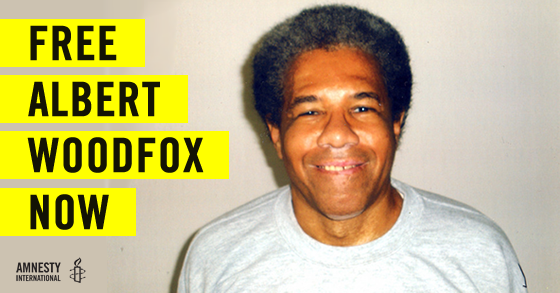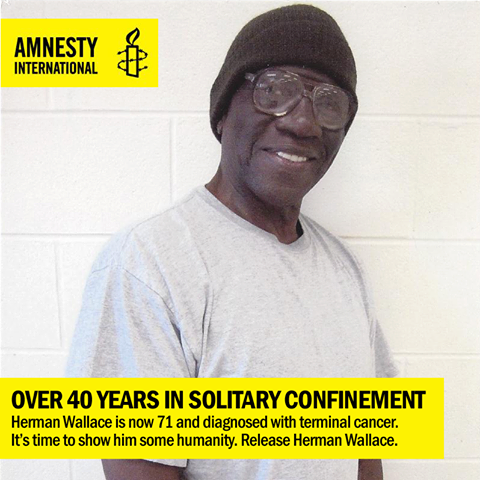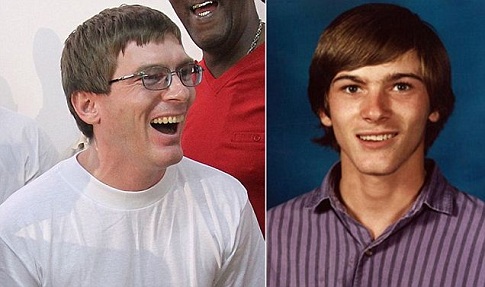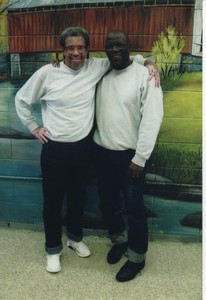On December 12th, 2015, New Orleans was the site of a special, one-day exhibit, Art for Rights, bringing together more than a dozen artists from around the world to highlight 12 of the most troubling human rights cases we face today. In honor of International Human Rights Day, and in conjunction with Amnesty’s annual Write for Rights campaign, each canvas told a bold story about injustice, persecution, and also courage. SEE THE REST OF THIS POST
Tag Archives: Louisiana
How has Albert Woodfox Survived 40 Years in Solitary Confinement?
By Kristin Hulaas Sunde, Global Content Producer at Amnesty International
Albert Woodfox has spent the last 40 years alone in a tiny US prison cell. His old friend Robert King – who was also imprisoned for decades in the notorious Angola prison – tells us how Albert’s political courage and global support are keeping him going, despite the pain and isolation.
“Angola was considered the bloodiest prison in America. There was slave-like labour – people worked 17 hours a day for two and a half cents an hour. There was a lot of raping going on – the prison guards sold the younger inmates [into sexual slavery].” SEE THE REST OF THIS POST
Don’t Let Herman Die Alone
Herman Wallace may not have a lot of time left – he’s 71 years old, has advanced liver cancer, and has survived four decades of imprisonment in the cruel, inhuman and degrading conditions of solitary confinement.
He and fellow prisoner Albert Woodfox, of Angola 3 fame, have been held in solitary confinement longer than anyone else in modern U.S. history. The men have spent the past 41 years of their lives alone in tiny cells for 23 hours a day, deprived of any meaningful human interaction.
He and fellow prisoner Albert Woodfox, of Angola 3 fame, have been held in solitary confinement longer than anyone else in modern U.S. history.
Attorney General Caldwell: Let the Ruling Stand
Today, Louisiana Attorney General James Caldwell has the chance to end a nightmare.
More than four decades ago, two young black men were convicted of the murder of a prison guard at Louisiana’s infamous Angola prison. The life sentence handed down to Albert Woodfox and Herman Wallace would not only put the men behind bars – it would plunge them into a nightmare of cruel inhuman and degrading treatment for the next 41 years of their lives.
Despite the fact that no evidence tied Woodfox or Wallace to the crime, the two men were placed in solitary confinement after their 1972 conviction; 23 hours a day isolated in a small cell, four steps long, three steps across. Robert King, who was investigated for the crime, but charged and convicted instead of the murder of a prison inmate, was “lucky” to be released after 29 years of this dehumanizing treatment. The other two members of the so-called “Angola 3” have remained there, waiting for the arc of the universe to bend slowly toward justice.
300th Person Exonerated By DNA Evidence in US
After 15 years of solitary confinement on Louisiana’s death row, Damon Thibodeaux became the 300th person exonerated based on DNA evidence. He had been wrongfully convicted of raping and strangling his 14-year-old step-cousin Crystal Champagne, largely based on a coerced confession.
Five years ago, the Innocence Project and the office of Jefferson Parish DA Paul Connick reopened the investigation into his case and last Friday revealed compelling DNA evidence that was used to exonerate him.
At a halfway house called Resurrection After Exoneration, Thibodeaux observed:
“It’s a surreal walk. It’s not something you can prepare yourself for because you’ve been in those (death row) conditions so long.”
14,600 Days in Solitary Confinement
23 hours a day isolated in a small cell, four steps long, three steps across. Three times a week for exercise in an outdoor cage, weather permitting. A few hours every week to shower or simply walk. Rare, fleeting human contact with prison guards, let alone with family.
This describes four decades of existence for Albert Woodfox and Herman Wallace in Louisiana, two members of the so-called “Angola 3” who pass their remaining hours “in the hole” to this day.
April 17th will mark 40 years — 14,600 days — of their nightmare. The conditions in which these two men are held, as well as the tragically absurd duration of this punishment, violate a host of human rights treaties to which the US is a party, including those covering basic standards for treatment of prisoners. Prisons simply shouldn’t operate this way in the US.
Top Ten Reasons to Write for Rights
 Fall is my favorite time of year: the air is cooler, the leaves are pretty, Amnesty International student groups are back together again, and people start signing up for the Write for Rights Global Write-a-thon.
Fall is my favorite time of year: the air is cooler, the leaves are pretty, Amnesty International student groups are back together again, and people start signing up for the Write for Rights Global Write-a-thon.
In this—the world’s largest human rights event—we use letters, cards and more to demand the human rights of individuals are respected, protected and fulfilled. We show solidarity with those suffering abuses and work to improve people’s lives.
Those are some pretty amazing reasons to participate, but in case you need more, here are my top ten reasons to Write for Rights: SEE THE REST OF THIS POST
Louisiana’s Angola 3: 100 Years of Solitude
By Wende Gozan Brown, Media Relations Director

Campaigning for justice for the Angola 3, Baton Rouge, 1972
Thirty nine years ago, three young black men were put in solitary confinement. Two are still there.
Collectively they have spent more than 100 years in isolation, most of it at the notorious Louisiana State Penitentiary in Angola.
The “Angola 3” maintain they were targeted for speaking out against inhumane treatment and racial segregation in the prison, and are now fighting for justice and recognition of their cruel, endless years in the hole.
Intractable Obstacles
Last year ended with the news of a record low number of death sentences, and with the decision by the American Law Institute, described today in the New York Times, to give up trying to fix our broken capital punishment system. The Institute, a collection of thousands of judges, lawyers and law professors, is very influential, in that it creates model penal codes which often serve as the basis for the real-life laws under which we live.
The Institute created the “modern” death penalty system that the US Supreme Court endorsed in 1976. But a report detailing factors we are already all too familiar with – persistent racial bias, inadequate defense, wrongful convictions, and a politicized judiciary – caused the Institute to vote to abandon capital punishment, citing “… intractable institutional and structural obstacles to ensuring a minimally adequate system for administering capital punishment.”
This doesn’t mean that the death penalty in the US will suddenly cease to exist; the deliberate and thoughtful analysis of the American Law Institute will not have an immediate impact in states where killing prisoners is routine and done without much thought at all.
Executions will continue. Three in fact, will occur on Thursday. While the usual suspects, Texas and Ohio, plan to execute Kenneth Mosley and Vernon Smith (aka Abdullah Sharif Kaazim Mahdi), Louisiana also has an execution scheduled on that day – its first in almost 8 years. Gerald Bordelon has “volunteered” to be executed. The next day, January 8, South Carolina will execute Quincy Allen. He, too, is “volunteering,” and has asked to be put to death by electrocution. The state will oblige him.
UPDATE: The state of South Carolina will NOT oblige Quincy Allen’s volunteering to be electrocuted. The South Carolina Supreme Court has stayed his execution.



